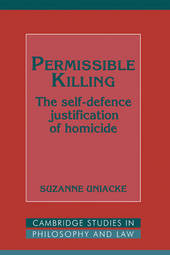
|
Permissible Killing: The Self-Defence Justification of Homicide
Hardback
Main Details
| Title |
Permissible Killing: The Self-Defence Justification of Homicide
|
| Authors and Contributors |
By (author) Suzanne Uniacke
|
| Series | Cambridge Studies in Philosophy and Law |
|---|
| Physical Properties |
| Format:Hardback | | Pages:256 | | Dimensions(mm): Height 229,Width 152 |
|
| Category/Genre | Ethics and moral philosophy |
|---|
| ISBN/Barcode |
9780521454087
|
| Classifications | Dewey:179.7 |
|---|
| Audience | | Professional & Vocational | |
|---|
|
Publishing Details |
| Publisher |
Cambridge University Press
|
| Imprint |
Cambridge University Press
|
| Publication Date |
14 July 1994 |
| Publication Country |
United Kingdom
|
Description
Do individuals have a positive right of self-defence? And if so, what are the limits of this right? Under what conditions, if any, does this use of force extend to the defence of others? These are some of the issues explored by Dr Uniacke in this comprehensive philosophical discussion of the principles relevant to self-defence as a moral and legal justification of homicide. She establishes a unitary right of self-defence and the defence of others, one which grounds the permissibility of the use of necessary and proportionate defensive force against culpable and non-culpable, active and passive, unjust threats. Particular topics discussed include: the nature of moral and legal justification and excuse; natural law justifications of homicide in self-defence; the Principle of Double Effect and the claim that homicide in self-defence is justified as unintended killing; and the question of self-preferential killing. This is a lucid and sophisticated account of the complex notion of justification, revolving around a critical discussion of recent trends in the law of self-defence.
Reviews'Suzanne Uniacke has written an adventurous and philosophically elegant work in which she justifies the intentional use of necessary and proportionate lethal force in private homicidal self-defence. Her contribution will definitely interest those engaged in discussions concerning the ethics of homicide.' The Review of Metaphysics
|